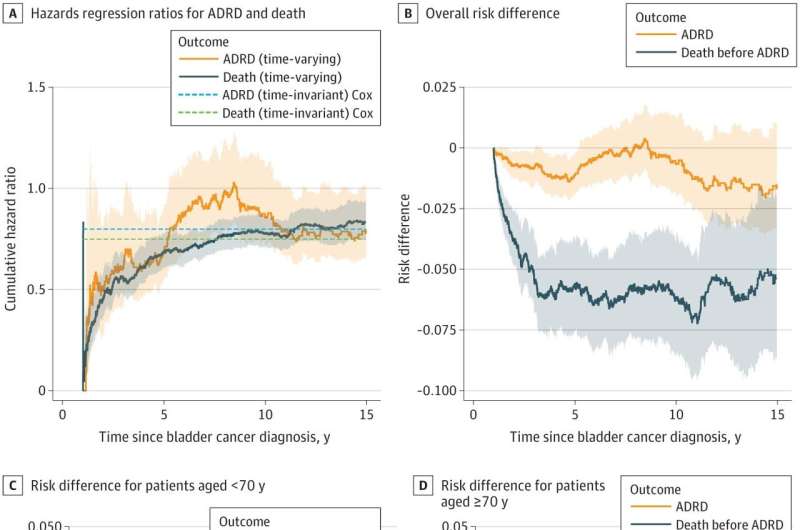Competing Risks Analyses of Alzheimer Disease and Related Dementias (ADRD) and Death A. The time-invariant Cox proportional hazards regression ratios for ADRD (hazard ratio, 0.80; 95% CI, 0.69-0.99) and death (hazard ratio, 0.75; 95% CI, 0.69-0.82) and nonparametric (time-varying) cumulative hazard ratios based on weighted Aalen-Johansen estimators for ADRD and death; shaded areas of corresponding colors indicate 95% CIs. B, Overall risk difference for ADRD and death before ADRD; shaded areas of corresponding colors indicate 95% CIs. C, Stratified analyses of patients younger than 70 years; shaded areas of corresponding colors indicate 95% CIs. D, Stratified analyses of patients aged 70 years or older; shaded areas of corresponding colors indicate 95% CIs. Credit: JAMA Network Open (2023). DOI: 10.1001/jamanetworkopen.2023.14336
The Bacillus Calmette-Guérin (BCG) vaccine—which prevents tuberculosis—offers multiple beneficial effects, and it's currently a recommended therapy for non–muscle-invasive bladder cancer. In a new study led by investigators at Massachusetts General Hospital (MGH) and Brigham and Women's Hospital (BWH), treatment with the BCG vaccine was associated with a reduced risk of Alzheimer's disease and related dementias. The findings are published in JAMA Network Open.
Although previous research has suggested a link between the BCG vaccine and a lower risk of dementia, studies were limited by size, study design, or analytical methods. To conduct a more robust study, Marc Weinberg, MD, Ph.D., an Instructor in Psychiatry at MGH, along with co-first authors Colin Magdamo, BS, (MGH Neurology) and Affan Zafar, MD (MGH and BWH Urology), senior author Sudeshna Das, Ph.D., (MGH Neurology), and colleagues followed 6,467 individuals for up to 15 years after they were diagnosed with non–muscle-invasive bladder cancer.
The group included 3,388 patients who underwent BCG vaccine treatment and 3,079 who served as controls, matched by factors such as age, sex, and medical co-morbidities.
During follow-up, 202 patients in the BCG vaccine group and 262 in the control group developed Alzheimer's disease and related dementias. The incidence was 8.8 per 1,000 person-years and 12.1 per 1,000 person-years in the respective groups.
Analyses revealed that treatment with the BCG vaccine was associated with a 20% lower risk of Alzheimer's disease and related dementias. The protective association was greater in patients aged 70 years or older. Additionally, during follow-up, 751 patients in the BCG vaccine group and 973 in the control group died. Thus, treatment with BCG vaccine was associated with a 25% lower risk of death.
"A vaccine like BCG, if proven effective, is a perfect example of a cost-effective, population-health–based solution to a devastating illness like Alzheimer's disease," says Weinberg. "We are shifting our focus towards studying the potential benefits of BCG vaccination of older adults in Alzheimer's disease–related clinical trials."
If a causal link is found, it will be important to understand the mechanisms involved. Weinberg and his colleagues note that the BCG vaccine's effects on the immune system may play a role.
More information: Marc S. Weinberg et al, Association of BCG Vaccine Treatment With Death and Dementia in Patients With Non–Muscle-Invasive Bladder Cancer, JAMA Network Open (2023). DOI: 10.1001/jamanetworkopen.2023.14336 jamanetwork.com/journals/jaman … /fullarticle/2805030
Journal information: JAMA Network Open
Provided by Massachusetts General Hospital
























